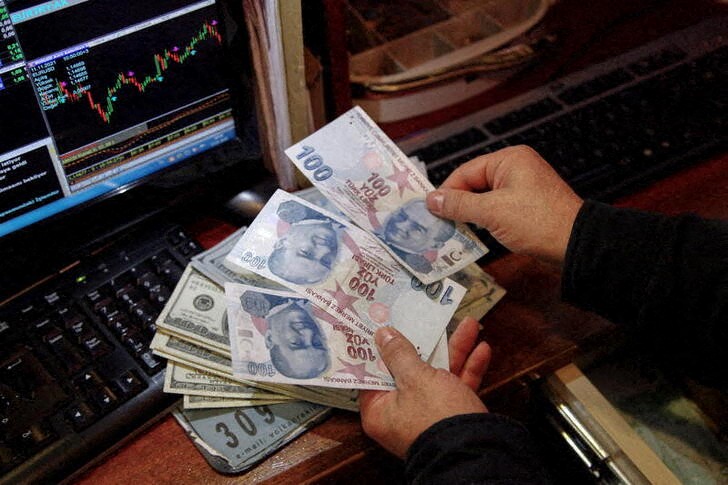By Nevzat Devranoglu and Ezgi Erkoyun
ISTANBUL (Reuters) - Turkey's lira rallied further on Thursday and was on track for its best week in two decades, boosted by a government plan to protect some deposits and the added support of state banks aggressively selling dollars.
The lira rallied as much as 10% to 10.25 versus the dollar, its strongest level in a month, before paring most of those gains to trade at 11.395 at 1444 GMT.
The currency has whipsawed back from a historic low of 18.4 on Monday when it was down some 60% on the year, capping a week of record volatility and intraday swings.
Despite the rebound, risk measures are near all-time highs as questions remain over the state's anti-dollarisation plan, which could further stoke inflation, add to public debt and eat into foreign reserves if the lira begins sliding again.
In an echo of past interventions, four sources told Reuters that Turkey's state banks heavily sold dollars this week after President Tayyip Erdogan announced the government would guarantee some deposits against depreciation losses.
One source said the interventions on Monday and Tuesday totalled $3 billion. The selling coincided with a drop in the central bank's foreign reserves, which a second source said amounted to $6 billion on those two days alone.
The three big state banks - Ziraat Bank, Vakif Bank and Halk Bank - did not immediately comment on possible interventions. The central bank was not immediately available to comment.
The central bank's balance sheet suggests that $5.5 billion of the fall in net reserves on Monday and Tuesday is due to foreign currency sales, said Haluk Burumcekci, head of Istanbul-based Burumcekci Consulting.
Reflecting market jitters, the cost of insuring against a sovereign default using CDS broke above 600 basis points earlier this week, before dipping back to 593, still near all-time highs, according to IHS Markit.
THIN RESERVES BUFFER
In 2019-2020 the central bank backed, via swaps, the sale of some $128 billion via state banks to stabilize the lira, depleting Turkey's foreign reserves. Earlier this year, the sales emerged as a focus of what the political opposition calls government mismanagement.
To address the latest turmoil, the central bank has announced five direct market interventions this month that bankers say totaled between $6-$10 billion. It has made no intervention notices this week.
Official data shows the bank's net foreign reserves dropped to $12 billion last week, from $21 billion a week earlier, as the interventions weighed.
Seeking to bolster its buffer, the central bank is wrapping up talks with counterparts in Azerbaijan and the UAE on a possible currency swap line and one deal is likely before year-end, separate sources told Reuters.
On Monday, President Tayyip Erdogan announced the series of steps that would shift the burden of a weakened currency to the Treasury and encourage Turks to hold lira rather than dollars. The central bank will backstop lira converted from hard currencies.
More than half of locals' savings is in hard currencies and gold, official data shows, due to a loss of confidence in the lira after years of depreciation and eroded central bank credibility.
Under pressure from Erdogan, the central bank has cut rates by 500 basis points to 14% since September.
The president has pledged to continue with his low-rates policy despite widespread criticism, while opposition parties have called for immediate elections over the currency meltdown.
Wall Street bank J.P. Morgan said markets expect a big reversal in monetary policy and are pricing in a 16 percentage point rise in Turkey's key interest rate over the next year.

Graphic: Markets pricing in run of Turkish rate hikes next year https://fingfx.thomsonreuters.com/gfx/mkt/gdvzymxxlpw/Pasted%20image%201640255443242.png
Graphic: The Erdonomics effect https://fingfx.thomsonreuters.com/gfx/mkt/dwvkrzxozpm/Pasted%20image%201640257543003.png